Embark on an enlightening journey through the labyrinth of South Africa’s Road Accident Fund (RAF) litigation. Unravel the complexities, debunk myths, and gain invaluable insights with our comprehensive guide. Whether you’re a claimant or a curious mind, prepare to be captivated!
Introduction
Have you ever found yourself entangled in the complex web of litigation with the Road Accident Fund (RAF) in South Africa? If you’re nodding in agreement or know someone who is, this article is crafted just for you.
Embarking on a legal journey, especially one as intricate as a claim against the RAF, can often feel like navigating a labyrinth without a map. The process can be bewildering, strewn with legal jargon, and, let’s be honest, a bit intimidating. But here’s the good news: you’re not alone on this journey.
This article is tailored specifically for individuals like you – RAF claimants who find themselves in the midst of litigation. Whether you’re just starting out, are knee-deep in the process, or merely seeking to understand the landscape, our aim is to be your compass. We’re here to guide you through the twists and turns of the RAF litigation process, shedding light on what can often seem like a dark and mysterious path.
Our journey together will be marked by clear, straightforward language – because we believe that understanding shouldn’t require a law degree. We’ll traverse through the various stages of the process, offering insights and advice, all while keeping things as engaging as a chat with a good friend.
So, take a deep breath and let’s embark on this enlightening journey together, unraveling the complexities of the RAF litigation process one step at a time.

Understanding the Role of the Road Accident Fund in South Africa
Have you ever wondered about the guardian angel that looks out for road accident victims in South Africa? That’s where the Road Accident Fund (RAF) steps in, playing a pivotal role in the lives of many. Let’s peel back the layers and understand what the RAF truly stands for and why it’s so crucial.
What is the RAF?
At its core, the RAF is a public entity, a kind of safety net established by the South African government. It’s tasked with a very special mission: to provide insurance cover to all users of South African roads. Think of it as a protective buffer, cushioning you from the financial shockwaves that often follow road accidents.
The Core Purpose of the RAF
- Providing Compensation: The RAF offers compensation to individuals who have been injured in road accidents. This also extends to the families of those who have tragically lost their lives. It’s about offering a helping hand during times of unforeseen distress.
- Covering Various Damages: This compensation isn’t just a blanket amount. It thoughtfully covers various aspects like medical expenses, loss of income or support, and in some cases, even funeral costs. However, remember, it doesn’t extend to covering damage to your vehicle – that’s a job for your car insurance.
Why Does the RAF Matter?
Imagine being involved in a road accident, grappling not just with physical injuries but also the looming cloud of financial uncertainties. The RAF steps in here to alleviate that financial burden, ensuring that the aftermath of an accident doesn’t derail your life or your family’s wellbeing.
The RAF’s role is not just about monetary support; it’s about restoring lives, giving people a chance to recover and rebuild without the added stress of unmanageable expenses.
The Road Accident Fund is more than just an insurance mechanism; it’s a vital part of South Africa’s commitment to safeguarding its citizens on the road. It’s about offering a semblance of security in the unpredictable journey of life. As we delve deeper into the RAF and its intricacies, keep in mind this fundamental purpose – the RAF is here to help and protect.

The RAF Claims Process: A Step-by-Step Guide
Embarking on a claim with the Road Accident Fund (RAF) can seem like a journey through a dense forest. But fear not! With the right map, it’s a path you can navigate with confidence. Here, we’ll break down the RAF claims process into clear, manageable steps. It’s all about knowing what to expect and being prepared for the journey.
Step 1: Determine Eligibility
- Were you involved in a road accident in South Africa?
- Did you suffer injuries as a result?
- Was the accident caused by another person’s negligence?
If you answered yes to these questions, you’re likely eligible to lodge a claim with the RAF.
Step 2: Gather Your Documentation
This step is akin to packing your backpack with essentials for a hike. You’ll need:
- A completed RAF claim form (RAF 1).
- A copy of your ID or passport.
- Police report or case number of the accident.
- Medical reports detailing your injuries.
- Proof of income if you’re claiming loss of earnings.
- Receipts for medical expenses incurred.
Step 3: Lodge Your Claim
- Deadline Alert: File your claim within three years from the date of the accident, or within two years if the responsible party is unknown.
- Submission: Claims can be submitted directly to the RAF offices or via registered mail.
Step 4: Claim Assessment by the RAF
- Patience is Key: The RAF will review your claim, a process that can take some time.
- Assessment: They may request additional information or conduct their own investigations into the accident.
Step 5: Settlement Offer or Rejection
- The Moment of Truth: The RAF will either make a settlement offer or reject your claim.
- Negotiation: If you’re not satisfied with the offer, negotiations can take place, often with the help of a legal professional.
Step 6: Payment or Legal Action
- Payment: If you accept the offer, the RAF will process your payment.
- Legal Action: In case of a rejection or unsatisfactory offer, you may need to take legal action, typically through the courts.
Some Friendly Advice
- Stay Organized: Keep a record of all your documents and correspondence with the RAF.
- Seek Legal Advice: Consider consulting a lawyer experienced in RAF claims. They can provide valuable guidance and support.
- Manage Expectations: The process can be lengthy and may test your patience. Stay informed and be prepared for possible delays.

While the RAF claims process might have its complexities, it’s a journey you can successfully navigate with the right preparation and knowledge. Each step taken brings you closer to the compensation you rightfully deserve, helping to lighten the load of recovery and financial strain.
Exploring the Tapestry of South Africa’s Legal System
In South Africa, the legal system is not just a set of rules and regulations; it’s a vibrant tapestry, woven from diverse threads of history and culture. Understanding this unique blend of legal traditions is crucial, especially when navigating a process like RAF litigation. Let’s embark on a journey through the rich landscape of South Africa’s legal system.
The Hybrid Nature: A Confluence of Legal Traditions
South Africa’s legal system is a hybrid, an intriguing fusion of different legal traditions. This blend includes:
- Roman-Dutch Civil Law: The bedrock of South African law, dating back to Dutch settlers in the 17th century. It forms the basis of our law of contract, tort, and many other areas.
- English Common Law: Introduced during the British colonial era, this influence is particularly evident in procedural aspects of law, as well as in areas like company law and evidence.
- Customary Law: Rooted in indigenous African traditions, customary law governs the social and legal affairs of many, especially in rural areas. It’s a living law, evolving with the customs and practices of communities.
Why This Matters
Understanding this hybrid system is key, particularly when dealing with a legal entity like the RAF. The blend of Roman-Dutch and English law principles means that both the substance of your claim and the procedures you follow are influenced by these diverse legal traditions.
Constitutional Supremacy: The Cornerstone of the System
- The Constitution: Adopted in 1996, South Africa’s Constitution is the ultimate guardian of your rights. It’s a beacon of democratic values, equality, and human dignity.
- Constitutional Court: The highest court in matters of constitutional law. Its decisions are crucial in shaping the legal landscape, including aspects relevant to RAF claims.
The Courts: A Hierarchical Structure
Understanding the court system helps in visualizing where your RAF case might fit:
- Magistrates’ Courts: Handling less severe cases and initial stages of litigation.
- High Courts: Dealing with more serious matters, including most RAF claims.
- Supreme Court of Appeal: The penultimate appellate court for non-constitutional matters.
- Constitutional Court: The apex of the court system, focusing on constitutional issues.

The Role of Customary Law
Customary law adds a unique dimension, especially in cases involving communities where traditional customs and practices are prevalent. It reflects the diverse cultural heritage of South Africa and is applied in conjunction with other legal principles.
A System Reflecting Diversity and Complexity
South Africa’s legal system is a reflection of its rich and diverse history, a complex but fascinating combination of different legal traditions. As we delve into the specifics of RAF litigation, remember that this system, with its unique characteristics, is designed to ensure justice and fairness, underpinned by the solid foundation of the Constitution.
In our next section, we’ll contrast the South African approach with legal processes in other countries, offering an international perspective on handling similar cases.
A Global Perspective: Comparing South Africa’s RAF Litigation to Other Countries
In the global village we inhabit, it’s enlightening to peek over the fence and see how our neighbors handle similar challenges. When it comes to the legal processes involved in road accident claims, each country has its unique approach. Let’s take a brief tour around the world and see how South Africa’s RAF litigation process compares with similar systems in other countries.
The United States: A Litigation-Centric Approach
- Private Insurance Dominance: Unlike South Africa’s RAF, road accident claims in the U.S. are predominantly handled through private insurance companies.
- Fault-Based System: Many states in the U.S. follow a fault-based system, where the party responsible for the accident bears the financial burden, a contrast to the RAF’s no-fault basis for claims.
- Litigation Frequency: In the U.S., road accident disputes often end up in court, with personal injury lawsuits being a common recourse.

The United Kingdom: Insurance and Compensation Claims
- Compulsory Insurance: In the UK, third-party insurance is mandatory for all vehicles. This insurance covers liabilities to other parties in an accident.
- Claims through Insurers: Much like the U.S., road accident claims in the UK are primarily processed through insurance companies.
- The Role of the Courts: While many claims are settled out of court, more complex cases, especially those involving severe injuries, often require legal proceedings.

Australia: A Mix of Public and Private Systems
- State-Based Systems: Australia’s approach varies by state, with some having government-controlled agencies similar to the RAF.
- Combination of Fault and No-Fault: Some Australian states have a mix of fault and no-fault schemes, offering a blend that caters to different types of accidents and injuries.
- Legal Representation: As in South Africa, legal representation in Australia is crucial for navigating the complexities of road accident claims.
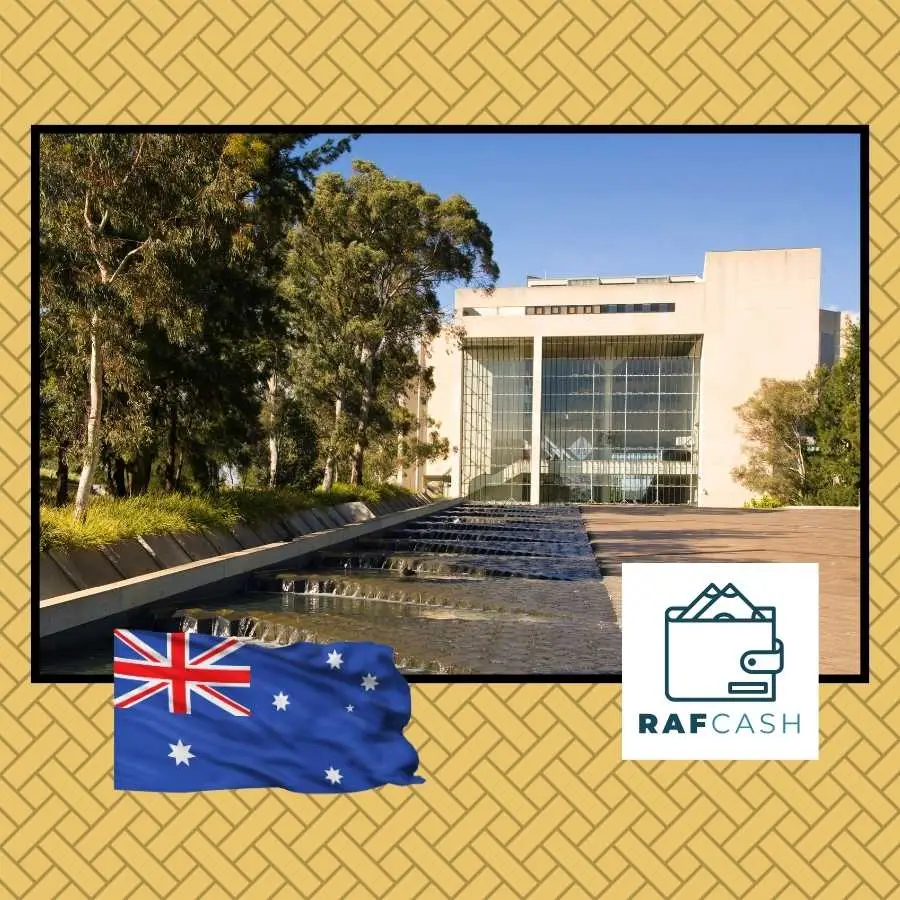
Germany: A Structured Insurance Framework
- Compulsory Vehicle Insurance: German law requires all vehicle owners to have third-party liability insurance.
- Quick Settlements: German insurance companies typically handle claims efficiently, with less frequent resort to litigation compared to countries like the U.S.

A World of Differences and Similarities
From this quick global tour, it’s evident that while the fundamental aim of compensating road accident victims is universal, the path to achieving this varies significantly. South Africa’s RAF system, with its no-fault basis and comprehensive coverage, stands out for its commitment to protecting all road users.
As we return to our focus on South Africa, remember that these international comparisons offer valuable insights, but the local context, with its unique legal tapestry, shapes our own journey through RAF litigation.
In our next section, we’ll delve into the different courts in South Africa, unraveling their roles and significance in the RAF litigation process.
Deciphering South Africa’s Court System: A Guide through its Judicial Hierarchy
In the vast ocean of South African law, the court system is a series of lighthouses, guiding the way through the murky waters of legal disputes, including those involving the Road Accident Fund (RAF). Let’s embark on an exploratory voyage through the different courts in South Africa, understanding their roles and limitations.
Magistrates’ Courts: The First Port of Call
- Handling Lesser Cases: Think of Magistrates’ Courts as the first responders in the judicial system. They deal with less serious criminal cases and civil disputes.
- Limited Jurisdiction: Their power is limited in terms of the severity of crimes and the value of civil disputes they can adjudicate.
- Accessibility: Located across the country, these courts are often where most people experience the legal system firsthand.
High Courts: Navigating Deeper Waters
- Jurisdiction over Serious Matters: High Courts are akin to deep-sea vessels, capable of handling more significant, complex cases, both civil and criminal, including substantial RAF claims.
- Appeals: They also hear appeals from Magistrates’ Courts, providing a second chance for justice.
- Provincial Presence: Each province has a High Court, ensuring that justice is accessible throughout the country.
Supreme Court of Appeal: The Penultimate Stop
- Appellate Authority: Sailing higher up, the Supreme Court of Appeal, located in Bloemfontein, exclusively hears appeals from lower courts. It’s a critical checkpoint before reaching the apex of the legal system.
- Non-Constitutional Matters: This court deals with non-constitutional matters, focusing on interpreting and applying the law.
Constitutional Court: The Lighthouse of Justice
- Highest Authority: At the pinnacle is the Constitutional Court, the ultimate guardian of our Constitution, interpreting and safeguarding the rights it enshrines.
- Constitutional Matters: It has the final say on constitutional issues, an essential aspect in the realm of law, including RAF-related matters that touch on constitutional rights.
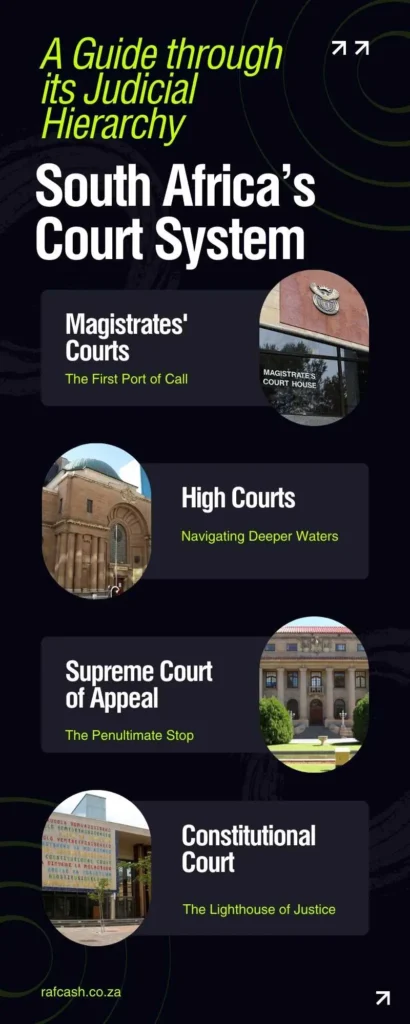
Understanding the Flow of RAF Cases
In the context of RAF litigation:
- Magistrates’ Courts: Might initially handle less substantial RAF claims.
- High Courts: Typically, the arena for more significant RAF claims.
- Supreme Court of Appeal and Constitutional Court: Involved in cases where crucial points of law are disputed, including those involving the RAF.
A Systematic Approach to Justice
Each court in the South African legal system plays a distinct role, ensuring that justice is served at every level. As you navigate your RAF claim, understanding where your case might fall in this hierarchy is vital. It’s about knowing which part of the judicial ocean you’re sailing in and what to expect on your legal voyage.
Next, we will embark on a deeper exploration of the High Courts and their specific relevance to RAF cases, shedding light on the nuances that make these courts so crucial in the context of RAF litigation.
The High Courts and RAF Litigation: A Closer Look
In the realm of Road Accident Fund (RAF) litigation in South Africa, the High Courts are like major crossroads where significant legal paths converge. Understanding their locations and roles is crucial for anyone navigating an RAF claim. Let’s zoom in on these pivotal institutions and their specific relevance to RAF cases.
The High Courts: Beacons of Justice in Each Province
South Africa’s High Courts are not confined to a single location; they cast their judicial net wide, anchored in various provinces. Here’s where you’ll find them:
- Gauteng: Divided between Pretoria (North Gauteng High Court) and Johannesburg (South Gauteng High Court).
- Western Cape: Sitting in the heart of Cape Town.
- Eastern Cape: With benches in Grahamstown, Port Elizabeth, East London, and Mthatha.
- KwaZulu-Natal: Located in Pietermaritzburg and Durban.
- Free State: The Bloemfontein court, which also houses the Supreme Court of Appeal.
- Limpopo: Based in Thohoyandou.
- Northern Cape: In the historic city of Kimberley.
- North West: Positioned in Mahikeng.
- Mpumalanga: Found in Mbombela.
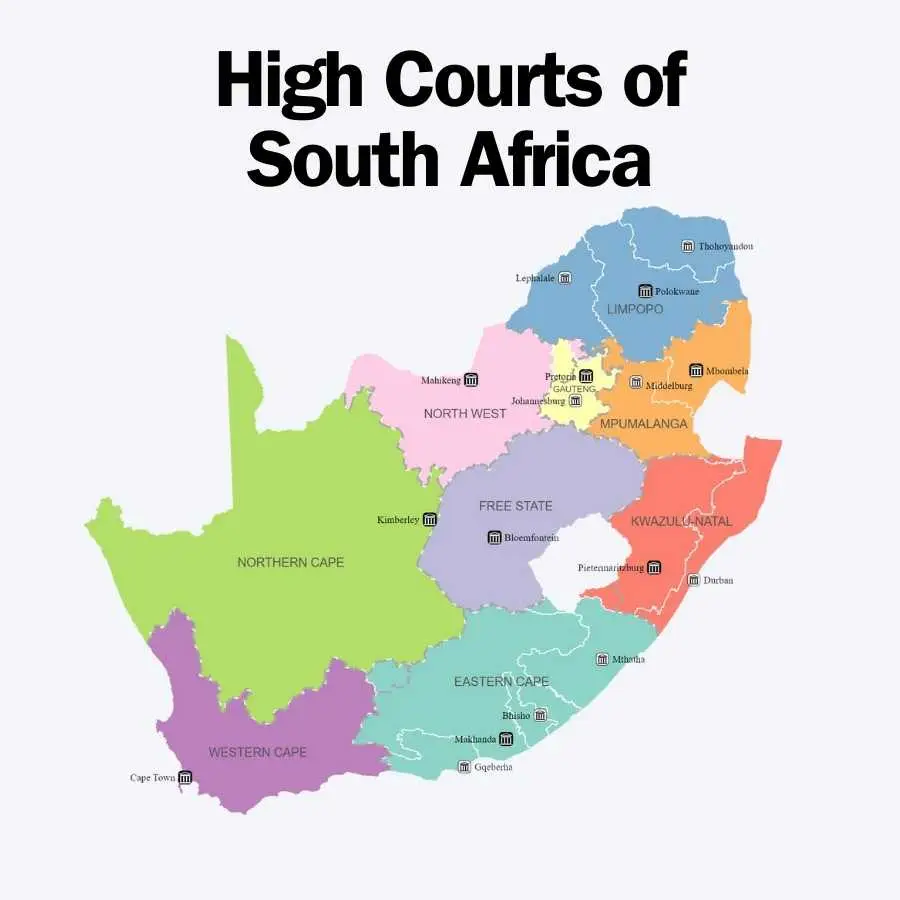
Why High Courts Matter in RAF Litigation
Jurisdiction Over Significant Claims
High Courts are the usual venues for more serious RAF claims. When you’re talking about substantial compensation amounts or intricate legal issues, these are the courts that handle them.
Appeals and Precedents
If a case initially heard in a Magistrates’ Court escalates, the High Court is the next destination. Here, decisions made in lower courts can be reviewed and potentially overturned.
The rulings of High Courts often set legal precedents. Their interpretations of the law can shape future RAF claims and policies.
Expertise and Resources
The intricate nature of RAF claims, often involving detailed medical evidence and complex financial calculations, is well within the purview of the High Courts.
With judges experienced in handling intricate matters, these courts are well-equipped to delve into the nuances of RAF litigation.
The High Courts in South Africa play a crucial role in the RAF litigation process. They are not just physical structures scattered across the country; they are central hubs of legal activity, determining the outcomes of significant RAF cases and influencing the course of future litigation.
Behind the Scenes: Court Rolls and Daily Proceedings in High Courts
Picture a bustling High Court, a stage where legal dramas unfold daily, particularly in RAF litigation cases. Understanding the court rolls and daily proceedings is like getting a backstage pass, offering a glimpse into the meticulous and sometimes intricate workings of these courts. Let’s pull back the curtain and explore.
Court Rolls: The Day’s Legal Agenda
What Are Court Rolls?
A Schedule of Cases: Court rolls are essentially timetables, listing all the cases set for hearing on a particular day. They include trials, motions, and sometimes appeals.
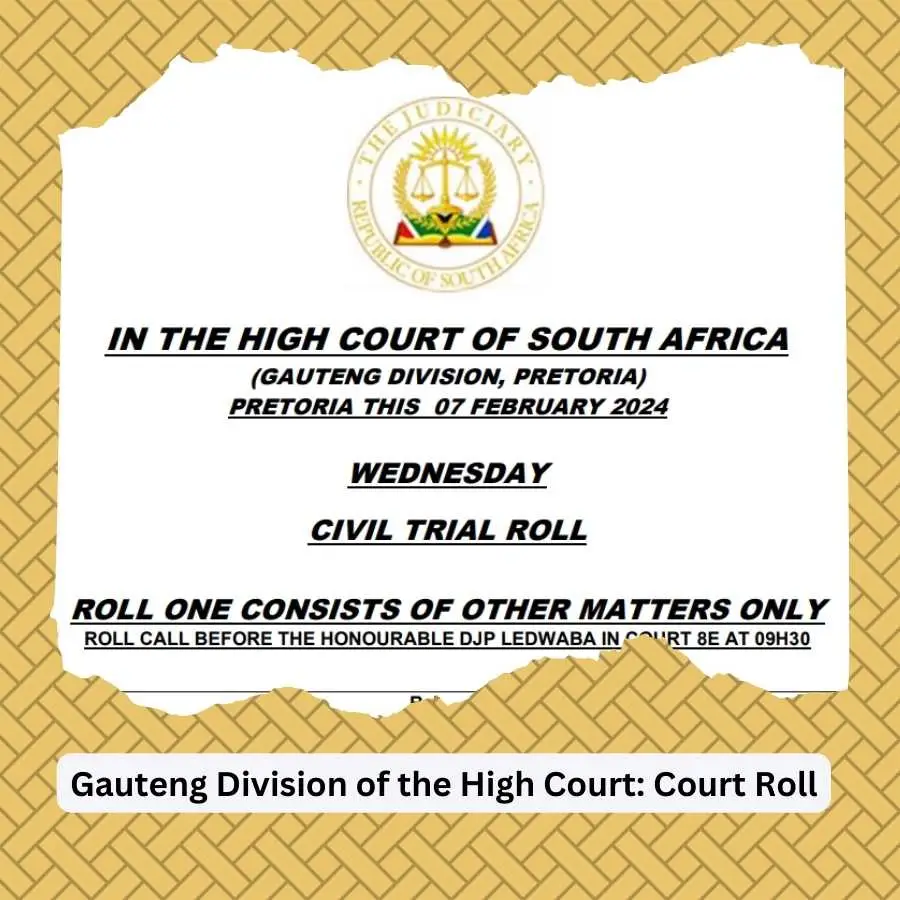
Organization and Access
Structured by Case Type: In the context of RAF cases, they fall under civil matters. Each case is allotted a specific time, although actual timings can shift depending on the court’s agenda.
Public Access: These rolls are usually public, often published on the court’s website or displayed at the courthouse. This transparency allows everyone involved – from legal teams to claimants – to know when their case will be heard.
Daily Proceedings: A Day in the Life of a High Court
The Start of the Day
Arrival and Check-In: Parties and their attorneys typically arrive early, checking the notice boards for any last-minute changes to the court roll.
Call to Order: Proceedings commence as the court is called to order, with everyone standing as the judge enters.
The Hearing Process
Case Roll Call: The clerk or registrar calls out the cases. Attorneys (or parties, if unrepresented) confirm their presence and readiness.
Hearing of Matters: RAF cases, like other civil matters, proceed through several stages:
- Opening Statements: The plaintiff’s legal team starts with an outline of the case against the RAF.
- Evidence Presentation: This includes witness testimonies and expert reports, crucial in RAF cases.
- Cross-Examination: The RAF’s legal team then has the opportunity to question the plaintiff’s evidence.
- Defense’s Turn: The RAF presents its case, followed by cross-examination from the plaintiff’s side.
- Closing Arguments: Both sides summarize their cases, highlighting key evidence and legal points.
- Judgement: The judge may either deliver a verdict immediately or adjourn to consider the decision, announced later.
Special Considerations in RAF Litigation
Backlogs and Delays: Due to the volume of cases, RAF matters can experience delays. Patience and preparedness for schedule changes are essential.
Complexity of Cases: Given the detailed medical and financial evidence typical in RAF claims, these hearings can be lengthy and complex.
A Structured Yet Dynamic Environment
The daily proceedings in a High Court, especially for RAF cases, are a blend of structure and unpredictability. Understanding this environment is key for claimants and legal practitioners alike. It’s not just about being present; it’s about being prepared for the formalities, the potential delays, and the rigorous scrutiny of evidence that these courts entail.
The Crucial Role of Expert Witnesses in RAF Litigation
In the intricate dance of RAF litigation, expert witnesses are akin to lead dancers, their testimony guiding the rhythm and flow of the case. Their roles – be it medical professionals or accident reconstruction analysts – are pivotal, often holding the key to unlocking a claimant’s rightful compensation. Let’s delve into how these experts influence the outcome of RAF cases.

Medical Professionals: Diagnosing the Impact
Vital Testimony on Injuries and Treatment
- Assessing Injuries: Medical experts provide an authoritative assessment of the claimant’s injuries, crucial in substantiating the claim.
- Future Medical Needs: They also project future medical requirements, ensuring that the claim covers ongoing medical expenses.
How Their Testimony Influences the Case
- Credibility: A medical expert’s testimony adds significant credibility to the claim, offering a professional evaluation of the injuries and their consequences.
- Quantifying Damages: Their input is vital in quantifying damages, especially non-economic ones like pain and suffering.
Accident Reconstruction Analysts: Unraveling the Event
Reconstructing the Accident
- Determining Fault: These experts analyze the accident scene to establish how the accident occurred and who was at fault.
- Scientific Analysis: They use scientific methods to reconstruct the accident, providing a clear picture of the events leading to the injuries.
The Influence of Their Findings
- Objective Insight: Their analysis offers an objective perspective on the accident, crucial in cases where fault or circumstances are disputed.
- Influencing Liability: A well-substantiated reconstruction can significantly influence decisions regarding liability and compensation.
The Weight of Their Words
- Expertise in the Courtroom: Both types of experts bring a level of expertise to the courtroom that is often beyond the reach of laypersons.
- Shaping the Narrative: Their testimonies can shape the narrative of the case, highlighting key aspects that support the claimant’s position.
Experts as Pillars of the Case
In RAF litigation, expert witnesses play more than just supporting roles; they are often central to the success of a claim. Their testimony bridges the gap between legal arguments and the technical realities of medical and accident-related issues. For claimants, understanding the value of these experts and how their insights bolster a case is crucial.
Delays and Their Impact on RAF Litigation Timelines
In the journey of RAF litigation, court delays can often feel like unexpected detours, prolonging the path to resolution. Understanding the causes and effects of these delays is crucial for claimants, as it helps in setting realistic expectations and preparing for the road ahead. Let’s explore this aspect of the litigation process.
The Causes of Court Delays in RAF Cases
High Volume of Claims
- A Flood of Cases: The RAF handles a vast number of claims, leading to a backlog. This high volume can slow down the processing and hearing of individual cases.
Complexity of Cases
- Intricate Details: RAF cases often involve complex legal, medical, and financial issues, requiring detailed examination and expert testimony. This complexity can extend the duration of court proceedings.
Administrative and Financial Constraints
- Systemic Challenges: Administrative inefficiencies within the RAF and the court system can contribute to delays. Additionally, financial constraints faced by the RAF can impact its ability to respond promptly and effectively to claims.
The Effects of Delays on Claimants
Extended Resolution Time
- A Test of Patience: Delays can significantly extend the time it takes to resolve a claim. What might have been a matter of months can turn into years, adding to the claimant’s uncertainty and stress.
Emotional and Financial Strain
- The Waiting Game: The prolonged process can exacerbate the emotional and financial difficulties faced by claimants. Waiting for compensation means continued financial pressure and emotional distress.
Legal Costs and Settlement Pressures
- Mounting Costs: Extended litigation can lead to increased legal costs, even with the contingency fee model. This financial burden can reduce the final payout for claimants, especially where the quantum determination is large.
- Pressure to Settle: Delays can sometimes pressure claimants into accepting lower settlement offers, as the immediate financial need outweighs the potential benefits of a prolonged litigation process.

Navigating These Challenges
- Stay Informed: Keep abreast of the progress of your case and understand the reasons for any delays.
- Seek Support: Consider seeking emotional and financial advice or support to manage the stress and burden of a prolonged legal battle.
- Legal Strategy: Work closely with your attorney to develop a strategy that takes into account the potential for delays.
A Reality of the Legal Journey
Court delays in RAF litigation are an unfortunate reality, but being aware of and prepared for them can make the journey more manageable. Patience and resilience, combined with informed legal guidance, are key to navigating these waters.
In the following section, we will delve into the nuances of court judgements versus out-of-court settlements in RAF cases, providing insights into these different pathways to resolution.
Court Judgments vs. Out-of-Court Settlements: Choosing Your Path in RAF Litigation
When navigating the Road Accident Fund (RAF) litigation process, claimants often face a critical crossroad: pursuing a court judgment or opting for an out-of-court settlement. Each path offers distinct advantages and challenges, and understanding these can profoundly impact your litigation strategy.
Court Judgments: The Route of Legal Determination
The Process
Trial Proceedings: A court judgment involves presenting your case before a judge (and sometimes a jury), where both sides – claimant and RAF – lay out their arguments and evidence.
Legal Scrutiny: This process is marked by rigorous legal examination, with expert testimonies and detailed evidence playing a pivotal role.
Advantages
Potential for Higher Compensation: Court judgments can sometimes lead to higher compensation, especially in cases where the claimant’s legal team successfully argues for extensive damages.
Legal Precedents: A favorable judgment can set a legal precedent, potentially aiding future claimants in similar situations.
Challenges
Time-Consuming: Court proceedings can be lengthy, extending the time before compensation is received.
Costly: Legal costs can accumulate over time, especially in prolonged trials.
Uncertain Outcome: The court’s decision can be unpredictable, and there’s always a risk of receiving less compensation than expected, or none at all.

Out-of-Court Settlements: The Path of Negotiation
The Process
Negotiated Agreement: Out-of-court settlements involve direct negotiations between the claimant (usually represented by an attorney) and the RAF, aiming to reach a mutually agreeable compensation figure.
Avoiding Trial: This route bypasses the need for a trial, often leading to a quicker resolution.
Advantages
Quicker Resolution: Settlements are typically faster than court proceedings, providing claimants with earlier access to compensation.
Reduced Costs: Avoiding a trial means lower legal costs, a significant consideration for many claimants.
Certainty: Settlements provide a definite outcome, eliminating the unpredictability of a court judgment.
Challenges
Potentially Lower Compensation: Settlements might result in lower compensation compared to what might be awarded in a court judgment.
Negotiation Skills Required: Effective negotiation is key, and the RAF’s experience in these matters can sometimes put individual claimants at a disadvantage.
Making the Choice
Consider Your Position: Assess the strength of your case, the extent of your damages, and your personal circumstances.
Seek Expert Advice: Consult with your legal team to understand the potential outcomes and implications of each path.
Personal Priorities: Consider your tolerance for risk, your need for a quick resolution, and your financial situation.
A Strategic Decision
Deciding between a court judgment and an out-of-court settlement in RAF cases is a strategic choice, influenced by individual circumstances and priorities. Understanding the pros and cons of each option is crucial in making an informed decision that aligns with your legal and personal goals.
Case Studies: Personal Journeys Through RAF Litigation
The landscape of RAF litigation is dotted with stories, each offering unique insights into the challenges and triumphs faced by claimants. Let’s delve into a couple of real-life narratives that bring to life the complexities of navigating the RAF system.
The Resilient Journey of Nomsa Mkhize
Nomsa Mkhize’s story began on an ordinary day that took an unexpected turn. A dedicated school teacher in Johannesburg, her life was dramatically altered by a road accident caused by a distracted driver. Nomsa’s small sedan bore the brunt of the impact, leaving her with serious injuries, including a broken leg and severe whiplash. Her ordeal with the Road Accident Fund started in her hospital bed, a place where she was surrounded by well-wishes but also faced with a daunting new reality.

Gathering the necessary documentation for her RAF claim, such as police reports and medical records, was an uphill battle, exacerbated by her limited mobility. The legal system, with its slow and intricate processes, seemed to offer little respite. Weeks turned into months, and Nomsa found herself entangled in a web of bureaucratic complexities, with her claim seemingly in a state of perpetual limbo.
The turning point in Nomsa’s story came when she connected with an online community of RAF claimants. Through shared experiences and support, she learned the importance of legal representation. Armed with a newfound resolve and a specialized attorney, her claim began to gain traction. Her attorney brought in medical professionals and an accident reconstruction analyst, whose expert testimonies added significant weight to her case.
After a strenuous two-year journey, Nomsa’s perseverance bore fruit as her claim was finally settled. The compensation she received, while not erasing the pain and struggle of her ordeal, offered a semblance of closure and a means to rebuild her life. Nomsa’s return to teaching was marked by a renewed spirit, with her experience shaping her into a vocal advocate for road safety.
Thabo’s Decision: A Settlement for Immediate Needs
In a different part of the country, Thabo, a young IT specialist, faced his own set of challenges following a road accident that left him with a spinal injury and partial paralysis. His journey through the RAF litigation process was a testament to the emotional and physical toll these cases can take.
Thabo’s case was complicated by the need for detailed medical evaluations to assess his long-term care and the necessary modifications to his living environment. As his case progressed, he encountered numerous delays, a common frustration in the RAF system. These postponements not only prolonged his case but also heightened the emotional and financial strain on him and his family.
Faced with a critical decision between a potentially higher compensation through a drawn-out court battle and an immediate but possibly lower settlement, Thabo chose the latter. This decision was driven by his pressing need for financial support to manage his medical expenses and to adapt his home to his new circumstances. While the settlement provided him with the much-needed funds for his immediate care, it also left him wondering if a prolonged legal fight might have resulted in a better outcome.
Reflecting on the Stories
Nomsa Mkhize’s and Thabo’s stories, though different in their paths and outcomes, offer a window into the personal and often challenging experiences of RAF claimants. Their journeys highlight the importance of informed decision-making, the value of expert legal and medical advice, and the resilience needed to navigate the often turbulent waters of RAF litigation.
As we move forward, these narratives set the stage for our exploration of recent legal reforms and amendments, offering a context that underscores the evolving nature of the RAF litigation process.
Legal Reforms and Amendments: Shaping the Future of RAF Litigation
The landscape of RAF litigation in South Africa is not static; it is continually reshaped and refined by legal reforms and amendments. These changes reflect evolving societal needs, economic pressures, and the pursuit of justice and efficiency in the compensation process. Let’s delve into the recent and pending legal reforms and amendments that are shaping the RAF litigation experience.
In recent times, there have been significant discussions and proposals aimed at reforming the Road Accident Fund. These reforms are driven by a need to streamline the claims process, address financial sustainability issues, and ensure fair compensation for accident victims.
One of the key proposed reforms is the introduction of a new tariff system for compensation payouts. This system aims to standardize the compensation for specific types of injuries, creating a more predictable and transparent framework for claimants. The goal is to reduce the variability and subjectivity in compensation awards, which can sometimes lead to inconsistencies and disputes.
Another crucial aspect of the proposed reforms is the focus on improving the financial stability of the RAF. The Fund has historically faced financial challenges, and these reforms seek to ensure its long-term viability. This includes considerations around how the Fund is financed and managed, with an emphasis on preventing fraud and reducing administrative costs.
The proposed amendments also look at enhancing the efficiency of the claims process. This includes streamlining administrative procedures, adopting technology to expedite claim processing, and setting clearer timelines for the resolution of claims. The aim is to reduce the backlog of cases and the delays that currently plague the system, providing quicker resolutions for claimants.
These reforms are not without controversy. Some stakeholders have raised concerns about how the changes might impact the rights of accident victims, particularly regarding the extent of compensation and access to legal recourse. There is an ongoing debate between balancing the need for a sustainable, efficient RAF system and ensuring that accident victims receive fair and adequate compensation.
As these legal reforms and amendments are debated and implemented, they will undoubtedly shape the RAF litigation landscape. For current and future claimants, staying informed about these changes is crucial. It not only impacts how they approach their claims but also influences their expectations regarding the compensation process.
In summary, the evolving legal framework surrounding the RAF is a reflection of the dynamic interplay between policy, economics, and justice. As these reforms take shape, they hold the potential to significantly alter the experience of navigating RAF litigation, ideally making it more efficient and equitable for all involved.
In the following section, we will explore the impact of RAF litigation on claimants, delving into the emotional, financial, and social ramifications of this often lengthy and complex process.
Court Declares Road Accident Fund’s Exclusionary Measures Unconstitutional
The court’s involvement in the Road Accident Fund eco-system is not limited to ruling on specific plaintiffs’ cases.
The High Court in Pretoria recently declared several Road Accident Fund (RAF) measures, including a Board Notice and various management directives, as unconstitutional, unlawful, and invalid. These measures had previously led to the exclusion of many motor vehicle accident victims from seeking compensation.
The court found that the RAF overstepped its authority by implementing these measures without proper statutory authorization, noting that they created unnecessary administrative barriers and prevented legitimate claims from being filed.
Significantly, the court ruled Regulation 7(1) and other related RAF decisions and notices that imposed stringent requirements for claim submissions as unconstitutional.
This ruling also retroactively affects claims: any claims rejected by the RAF of the historical period identified, due to non-compliance with these now-invalid directives, are considered null and void.
Affected claimants were given a six-month window to resubmit their claims in compliance with the RAF Act.
The RAF is also required to inform all affected individuals about these new terms and cover the legal costs incurred by the nine applicants who initiated this legal challenge.
The judgment highlights the necessity for the RAF to adhere to the RAF Act, including in the submission of specific supporting documents for claims.
The judges emphasized the importance of proper consideration and thorough consultation before imposing new requirements for claims submission. 4
This decision marks a significant turn in RAF litigation, opening the door for previously excluded claimants to seek compensation and ensuring that future claims are handled in line with the law.
The Impact of RAF Litigation on Claimants
Embarking on a legal battle with the Road Accident Fund (RAF) can be more than just a journey through the corridors of justice. It often becomes a deeply personal odyssey, marked by emotional, financial, and social challenges. The impact of RAF litigation on claimants extends far beyond the courtroom, touching every facet of their lives.
The Emotional Rollercoaster
Stress and Anxiety
Uncertainty: The unpredictability of litigation outcomes can be a constant source of stress for claimants. Each step in the process, from filing a claim to awaiting a judgment or settlement, brings its own set of anxieties.
Reliving Trauma: For many, the process involves repeatedly revisiting the traumatic experience of the accident, which can exacerbate existing emotional distress and hinder psychological recovery.
The Burden of Patience
Prolonged Process: RAF litigation is often a marathon, not a sprint. The lengthy timelines, exacerbated by legal complexities and procedural delays, can test the resilience and patience of claimants.
The Financial Strain
Mounting Expenses
Medical Costs: Many claimants face ongoing medical expenses related to their accident injuries. Without timely compensation, these costs can become overwhelming.
Loss of Income: For those whose injuries affect their ability to work, the loss of income during the litigation period adds to the financial burden.
Legal Costs
Navigating Costs: While some attorneys work on a contingency basis, the prolonged nature of litigation can still lead to significant legal expenses, particularly in cases that demand extensive evidence gathering and expert testimony.
The Social Dimension
Strain on Relationships
Family and Social Life: The stress and demands of litigation can strain relationships with family and friends. The claimant’s preoccupation with the case and its implications can overshadow other aspects of their personal life.
Isolation and Community
Withdrawal: Dealing with the demands of litigation, coupled with recovery from injuries, can lead to social withdrawal. Claimants might find themselves increasingly isolated, distanced from their usual support networks.
A Challenging Journey
The journey through RAF litigation is far more than a legal process; it’s a life-altering experience that can shape a claimant’s emotional well-being, financial stability, and social relationships. The impact is multifaceted, often leaving lasting imprints long after the case is settled.
For claimants, understanding these potential impacts is crucial. It prepares them not just for the legal battle but also for the personal challenges that accompany it. Equally important is seeking the necessary support – be it legal, emotional, or financial – to navigate this journey with resilience and hope.

Practical Advice for Road Accident Fund Plaintiffs
Embarking on RAF litigation is akin to setting sail on a complex voyage. For claimants, navigating these waters can be daunting, but with the right compass of advice, the journey can be less turbulent. Here’s some practical guidance for those charting a course through the intricacies of RAF claims.
Firstly, understanding the process is key. Knowledge is your anchor in the stormy seas of litigation. Familiarize yourself with the stages of your claim, from submission to resolution. This understanding helps demystify the process and sets realistic expectations.
When it comes to documentation, meticulousness is your watchword. Accurate and comprehensive documentation forms the backbone of a successful claim. Ensure you have all necessary medical reports, police statements, and evidence of expenses related to your accident. These documents speak volumes in court, often louder than words.
Legal representation is not just a shield; it’s your guiding star. Choose an attorney who specializes in RAF claims. Their expertise can make a significant difference in navigating the legal complexities and in negotiating with the RAF. Discuss fee structures upfront to avoid future misunderstandings. Remember, a good lawyer not only fights for your rights but also keeps you informed and involved at every turn.
Patience is more than a virtue in RAF litigation; it’s a necessity. The process can be lengthy, often stretching over months or even years. Prepare mentally for this duration. Patience, coupled with persistence, is often the key to seeing your claim through to a successful conclusion.
Financial planning during this period cannot be overstressed. With potential delays in receiving compensation, budgeting becomes crucial. Plan for the short and long term, considering your current needs and potential future expenses.
The emotional toll of litigation is as real as the legal battle. It’s essential to take care of your mental health. Seek support from family, friends, or professional counselors. Sharing your experience with others who have walked this path can be both comforting and enlightening.
Being proactive is your rudder in steering the claim. Stay in regular contact with your attorney, and don’t hesitate to ask questions or express concerns. Being proactive also means keeping abreast of any changes in RAF policies or legislation that might affect your claim.
Finally, remember that each claim is unique. Your experience may differ from others’, so avoid drawing direct comparisons. Focus on your journey, armed with the right information, support, and attitude.
In conclusion, while the path of RAF litigation can be challenging, equipped with the right advice and support, claimants can navigate these waters more confidently and effectively. The journey might be long, but with perseverance, a fair resolution is within reach.

The Cornerstone of Success: The Benefits of Legal Representation in RAF Claims
When embarking on the journey of an RAF claim, the path can be riddled with legal intricacies and procedural nuances. In such a scenario, having legal representation is not just an advantage; it’s a cornerstone of success. Let’s explore the multifaceted benefits of enlisting a legal expert in your RAF claim journey.
Expert Navigation Through Legal Complexities
The world of RAF claims is steeped in complex legal procedures and specific regulatory requirements. A specialized attorney brings a wealth of knowledge and experience, crucial for navigating these complexities. They understand the intricacies of the RAF Act, are familiar with the latest amendments and legal precedents, and know how to maneuver through the labyrinth of legal processes effectively.
Maximizing Your Claim’s Potential
One of the most significant advantages of legal representation is the potential to maximize your claim. Lawyers skilled in RAF matters are adept at accurately assessing the full extent of your damages – including future medical costs, loss of income, and general damages for pain and suffering. Their expertise ensures that your claim is comprehensively compiled, leaving no stone unturned.
Strategic Negotiation and Advocacy
Attorneys are not just legal advisors; they are also your advocates and negotiators. In the realm of RAF claims, negotiations can be intricate and require a strategic approach. Lawyers bring negotiation skills honed through experience, ensuring that your case is compellingly presented and that any settlement offers are fair and just. They serve as your voice, advocating your rights and interests.
Mitigating the Risk of Under-Settlement
Without legal guidance, there’s a risk of under-settlement – accepting an offer from the RAF that doesn’t fully compensate for your losses. An experienced attorney will evaluate settlement offers critically, ensuring they align with your needs and the long-term implications of your injuries.

Reducing the Emotional and Administrative Burden
Navigating RAF claims can be emotionally taxing and administratively burdensome. Legal representatives alleviate much of this strain by handling the bulk of the paperwork, correspondence, and procedural requirements. This support allows you to focus on your recovery and personal well-being, knowing that the administrative and legal aspects of your claim are in capable hands.
Contingency Fee Structure: Accessibility to Legal Assistance
Many lawyers handling RAF cases operate on a contingency fee basis, meaning they charge a percentage of the settlement amount. This structure makes legal services accessible to those who might not afford them otherwise, ensuring that justice is not just for those who can pay upfront.
A Wise Investment for Your Legal Journey
In conclusion, enlisting legal representation in RAF claims is more than just a form of assistance; it’s a strategic decision that enhances your chances of a successful outcome. A skilled attorney brings expertise, advocacy, and peace of mind, transforming the daunting journey of an RAF claim into a navigable path towards fair compensation.
Charting the Future: Trends and Trajectories in RAF Litigation
As we look towards the horizon of RAF litigation, it’s clear that the landscape is poised for change. With technological advancements and ongoing legal reforms, the way RAF claims are handled is evolving. Understanding these future trends is crucial for claimants, legal practitioners, and policymakers alike. Let’s speculate on the potential shifts and trends that might shape the future of RAF litigation.
Technological Advancements: A Digital Revolution in Claim Processing
The advent of new technologies is set to revolutionize RAF claim processing. We can anticipate a more digital-centric approach, with the following potential impacts:
- Online Claim Filing: The future could see the full integration of online platforms for filing and tracking RAF claims, making the process more accessible and transparent.
- Data Analytics and AI: The use of artificial intelligence and data analytics in assessing claims could streamline the process, making it faster and more efficient. These technologies might assist in evaluating the validity of claims and predicting outcomes based on historical data.
- Virtual Hearings and Consultations: As seen in other legal areas, RAF litigation might increasingly adopt virtual hearings and consultations, particularly for preliminary matters, reducing the need for physical court appearances.
Legal Reforms: Shaping a Sustainable and Fair System
Ongoing and potential legal reforms are expected to reshape RAF litigation in several ways:
- Revised Compensation Structures: We might see the implementation of new compensation structures or caps, aimed at ensuring the financial sustainability of the RAF while balancing claimants’ needs.
- Streamlined Procedures: Reforms may introduce more streamlined procedures for handling claims, reducing the backlog and expediting resolutions.
- Focus on Fraud Prevention: With a significant portion of the RAF’s financial challenges attributed to fraudulent claims, future reforms are likely to include stricter measures for fraud detection and prevention.

The Impact of Societal Changes
- Road Safety Initiatives: Enhanced road safety campaigns and initiatives could lead to a decrease in road accidents, subsequently affecting the volume of RAF claims.
- Changing Mobility Patterns: Trends such as the rise in remote work and evolving urban mobility (like increased cycling) might influence the nature and frequency of road accidents, potentially impacting RAF litigation trends.
The Role of Public Awareness and Advocacy
Increased public awareness and advocacy regarding road safety and rights under the RAF can lead to more informed claimants. This awareness might result in claims being more accurately filed and a better understanding of the litigation process among the general populace.
An Evolving Landscape
The future outlook of RAF litigation is one of evolution and adaptation. As we move forward, these anticipated trends – driven by technology, legal reforms, and societal shifts – are likely to make the process more efficient, transparent, and attuned to the needs of the modern claimant. While change is inevitable, the core objective remains: to provide fair and adequate compensation to those affected by road accidents.
Understanding Court Dates in High Courts for RAF Litigation in South Africa
Navigating the Road Accident Fund (RAF) litigation process involves a critical milestone: the allocation and management of court dates, especially when cases escalate to the High Courts. The scheduling of court dates in this context is a vital component that influences the trajectory and duration of RAF claims. Let’s explore the nuances of court dates in the High Courts of South Africa within the RAF litigation framework.
The Significance of Court Dates in High Courts
Court dates in High Courts are not just calendar entries; they are pivotal moments where the substantive aspects of RAF claims are presented and contested. These dates are when claimants and the RAF, through their legal representatives, bring forth their evidence, witness testimonies, and legal arguments before a judge. The proceedings on these dates can significantly impact the direction and outcome of the litigation.
Scheduling Court Dates
- Case Load and Prioritization: High Courts handle a wide array of cases, including serious criminal and civil matters. RAF claims are slotted into this busy schedule, with court dates determined based on various factors like case urgency, the court’s workload, and the readiness of the parties involved.
- Notice Period: Parties are typically informed of their court dates well in advance, allowing ample time for preparation. This notice is crucial, as it dictates the timeline for submitting final documents, expert reports, and other preparatory steps.
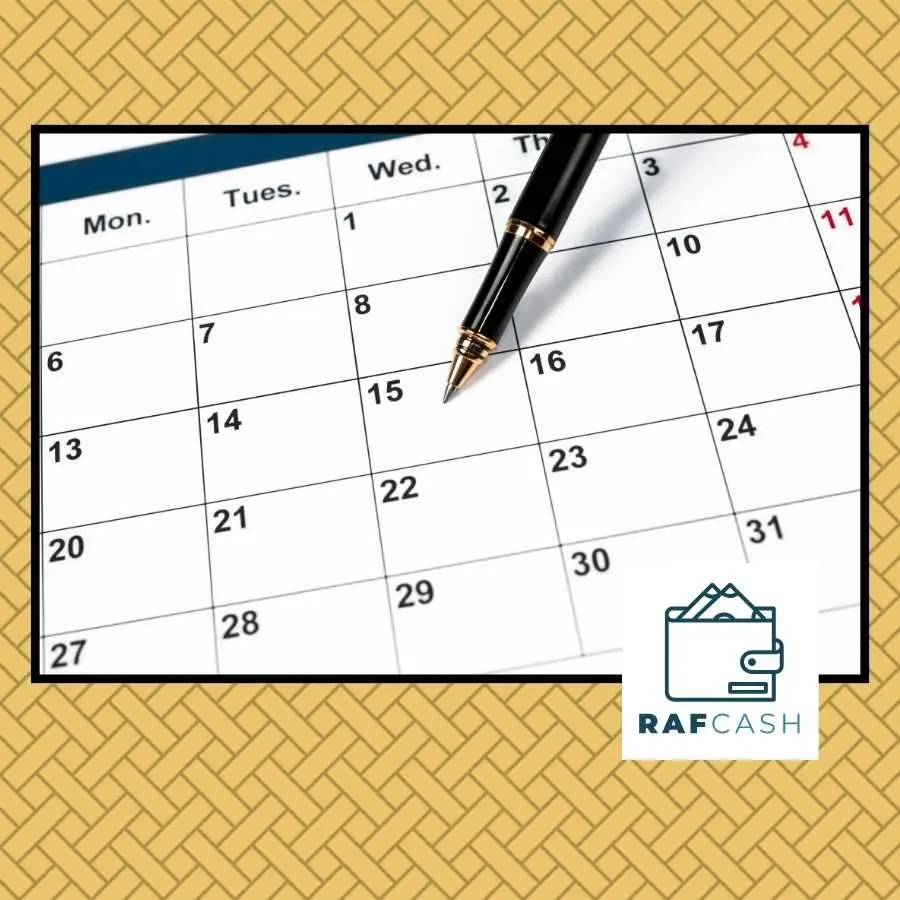
Impact of Court Delays on RAF Cases
- Backlogs and Postponements: The High Courts, grappling with heavy caseloads, sometimes face backlogs leading to postponements of court dates. These delays can prolong the resolution of RAF claims, extending the period of uncertainty for claimants.
- Rescheduling: In instances where court dates are postponed, new dates are allocated. This rescheduling process is subject to the court’s availability and the schedules of the legal representatives and parties involved.
The Claimant’s Preparation for Court Dates
- Legal Representation: Having an experienced attorney is crucial for claimants. Lawyers not only prepare the necessary legal documents and evidence but also guide claimants through the court procedures.
- Understanding the Process: Claimants should be well-informed about what to expect on their court date. This includes understanding the nature of the proceedings, the type of questions they might be asked, and the overall courtroom etiquette.
Court dates in High Courts are a critical juncture in the RAF litigation process. They mark the transition from preparatory legal work to active legal proceedings. For claimants, these dates are not just about presenting their case but also about understanding and preparing for the procedural aspects of High Court litigation. While delays and rescheduling are part of the reality, being well-prepared and having proficient legal representation can significantly mitigate their impact.
Dispelling Common Myths about the Road Accident Fund
In the realm of RAF litigation, misconceptions can often cloud the judgment of claimants, leading to unrealistic expectations or misinformed decisions. Let’s address and dispel some of the most common myths surrounding the Road Accident Fund, clarifying aspects such as eligibility, time limits, coverage limitations, the role of attorneys, and payment timelines.
Myth 1: Automatic Eligibility for Compensation
The Reality:
- Criteria-Based Eligibility: Contrary to what many believe, being involved in a road accident in South Africa doesn’t automatically qualify one for compensation from the RAF. Eligibility hinges on specific criteria, including proving that the accident was caused by another’s negligence.
- Exclusion of At-Fault Claimants: If an individual is primarily responsible for their accident, they are generally not eligible for compensation from the RAF.
Myth 2: Unlimited Time to File a Claim
The Reality:
- Statutory Time Limits: There’s a common misconception that one can file a claim with the RAF at any time after an accident. In reality, claimants have a limited window – typically three years from the accident date, or two years if the identity of the at-fault party is unknown.
- Importance of Timeliness: Missing these deadlines can result in the forfeiture of the right to claim, making timely action crucial.
Myth 3: Comprehensive and Unlimited Coverage
The Reality:
- Defined Scope of Coverage: The RAF doesn’t provide a blanket coverage for all aspects related to a road accident. Its coverage mainly includes medical expenses, loss of earnings/income, and in cases of death, funeral expenses and loss of support for dependents.
- Exclusion of Property Damage: Contrary to some beliefs, the RAF does not cover property damage such as vehicle repairs. This coverage falls under regular vehicle insurance.
Myth 4: Attorneys Are Unnecessary
The Reality:
- Value of Legal Expertise: Many claimants assume that they can navigate the RAF claim process alone. However, the complexities and legal intricacies involved often make the expertise of an attorney invaluable.
- Contingency Fee Arrangements: Most attorneys handling RAF claims offer contingency fee arrangements, making legal assistance more accessible without upfront fees.
Myth 5: Immediate Payment Post-Settlement
The Reality:
- Payment Timeline Variability: There’s a misconception that compensation is paid out immediately after a settlement or court judgment. In reality, the payment process can vary considerably in duration, often taking a minimum of several months.
- Factors Affecting Timeline: The timeline for receiving payment depends on various factors, including the RAF’s processing efficiency and administrative factors.
A Clearer Understanding
Dispelling these myths is essential for a realistic and informed approach to RAF litigation. Understanding these aspects helps claimants set appropriate expectations and equips them with the knowledge to navigate their claims effectively.
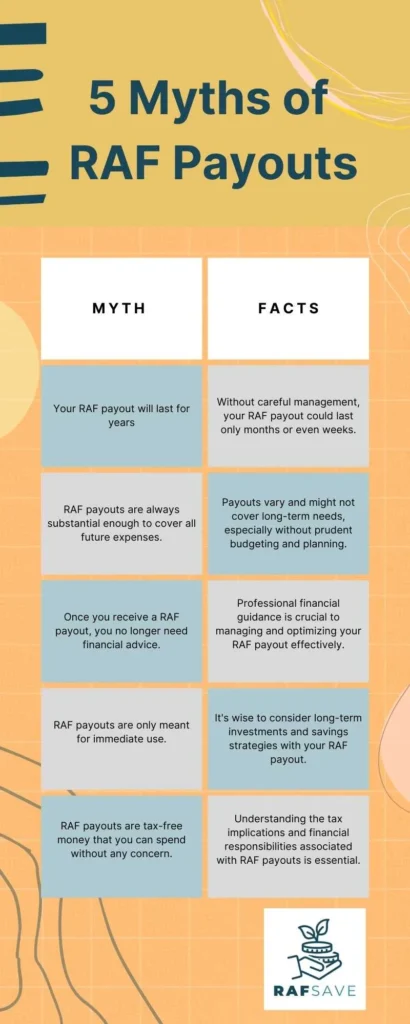
Conclusion: Walking the RAF Legal Journey with Confidence
As we conclude our exploration of the Road Accident Fund (RAF) litigation process in South Africa, it’s clear that this journey, while complex, is navigable with the right knowledge and guidance. We’ve traversed various terrains, from understanding the RAF’s role to the nuances of court procedures and the importance of legal representation. The path to successfully managing an RAF claim involves being well-informed, patient, and proactive.
Key Takeaways
- The Role of RAF: We began by delving into the purpose of the RAF, highlighting its crucial role in providing compensation to those injured in road accidents and to the families of deceased victims.
- Understanding the Legal Process: The journey through RAF litigation is underpinned by South Africa’s unique hybrid legal system. Navigating this system requires an understanding of its structure, from the Magistrates’ Courts to the Constitutional Court.
- The Importance of Expertise: Legal representation is more than just a formality; it’s a strategic advantage. Experienced attorneys can effectively navigate the legal complexities, maximize claim potential, and provide essential support.
- Emotional and Financial Impacts: RAF litigation is not just a legal endeavor but also a personal journey. Claimants often face emotional stress and financial strain, highlighting the need for comprehensive support throughout the process.
- Dispelling Myths: We addressed common misconceptions about the RAF, emphasizing the importance of accurate information in making informed decisions.
The Path Forward
As the RAF and its litigation processes continue to evolve, staying abreast of legal reforms, technological advancements, and societal changes is vital. These elements will shape the future landscape of RAF claims and influence the strategies of claimants and legal practitioners alike.
Empowerment Through Information
The essence of successfully navigating RAF litigation lies in being well-informed. Understanding your rights, the intricacies of the claim process, and the potential impacts of your decisions is crucial. Equally important is the realization that each claim is unique, and what works for one claimant may not be the best course for another.
Seeking Professional Guidance
The value of professional legal advice cannot be overstated. An experienced attorney not only provides legal expertise but also offers a guiding hand through the emotional and procedural complexities of RAF litigation.
Final Thoughts
For those embarking on or currently navigating an RAF claim, remember that knowledge is power, and expert guidance is your compass. Armed with these, you can approach your RAF litigation journey with confidence, resilience, and a clearer vision of the path ahead.
Don’t let the RAF maze leave you puzzled. Stay ahead and informed with the latest insights, tips, and trends in the RAF ecosystem. Subscribe to our newsletter and turn confusion into clarity. Your journey to understanding RAF litigation starts here!
Frequently Asked Questions
How Long Does RAF Litigation Typically Take?
RAF litigation can vary in duration, often taking several months to years, depending on case complexity and court backlogs.
What Factors Contribute to Delays in RAF Court Proceedings?
Delays are often due to high case volumes, complex legal or medical issues requiring detailed examination, and administrative or financial constraints of the RAF.
Can I Represent Myself in High Court for an RAF Case?
While self-representation is possible, the complexities of High Court procedures and RAF regulations generally make it advisable to seek legal representation.
What Role Do High Courts Play in RAF Litigation?
High Courts handle serious RAF claims, especially those involving substantial compensation or complex legal issues, and hear appeals from lower courts.
How Do I Find Out My RAF Case Court Date?
Court dates are listed on court rolls, which are publicly accessible, often published on the court’s website or available at the courthouse.
What Is the Importance of Expert Witnesses in RAF Cases?
Expert witnesses, like medical professionals and accident analysts, provide crucial evidence on injury impact and accident details, influencing claim outcomes.
How Does an Attorney Help in an RAF Claim?
Attorneys navigate legal complexities, maximize claim potential, negotiate settlements, and reduce the emotional and administrative burden on the claimant.
Are There Time Limits for Filing an RAF Claim?
Yes, typically a claim must be filed within three years from the accident date, or two years if the at-fault party is unknown.
What Happens If My RAF Claim Goes to Court?
Your case will be presented in court, involving evidence presentation, witness testimonies, and legal arguments, after which a judge will make a decision.
Can Settlements Be Negotiated Outside of Court in RAF Cases?
Yes, out-of-court settlements are common in RAF cases, involving negotiations between the claimant (or their attorney) and the RAF to agree on compensation.
Glossary
- Litigation: The process of taking legal action or resolving disputes in court.
- High Court: A senior court in South Africa that handles serious civil and criminal cases, including appeals from lower courts.
- Claimant: An individual who makes a claim or lodges a legal case, especially in the context of seeking compensation.
- Negligence: A failure to take reasonable care or steps to prevent loss or injury to another person.
- Eligibility: The state of being qualified or entitled to engage in a particular activity or to claim specific rights.
- Compensation: Payment or remuneration given to someone in recognition of loss, suffering, or injury.
- Contingency Fee: A payment to a lawyer that is contingent upon winning a case, often defined as a percentage of the compensation awarded.
- Settlement: An agreement reached between parties in a legal dispute, often involving payment, before or after court proceedings.
- Statutory Time Limits: Legally established timeframes within which certain actions, such as filing a claim, must be taken.
- Backlog: An accumulation of uncompleted work or matters needing to be dealt with, common in legal settings.
- Expert Witness: A specialist in a particular field whose opinion may be sought in court cases to provide detailed information or expert opinion.
- Legal Precedent: A legal case that establishes a principle or rule that is followed by other courts in future similar cases.
- Appellate Court: A court having jurisdiction to review decisions of lower courts or tribunals.
- Fraud Detection: The process of identifying fraudulent activities, particularly relevant in financial and legal contexts.
- Procedural Delays: Delays in the progress of a legal case due to procedural issues such as scheduling, administrative challenges, or legal complexities.

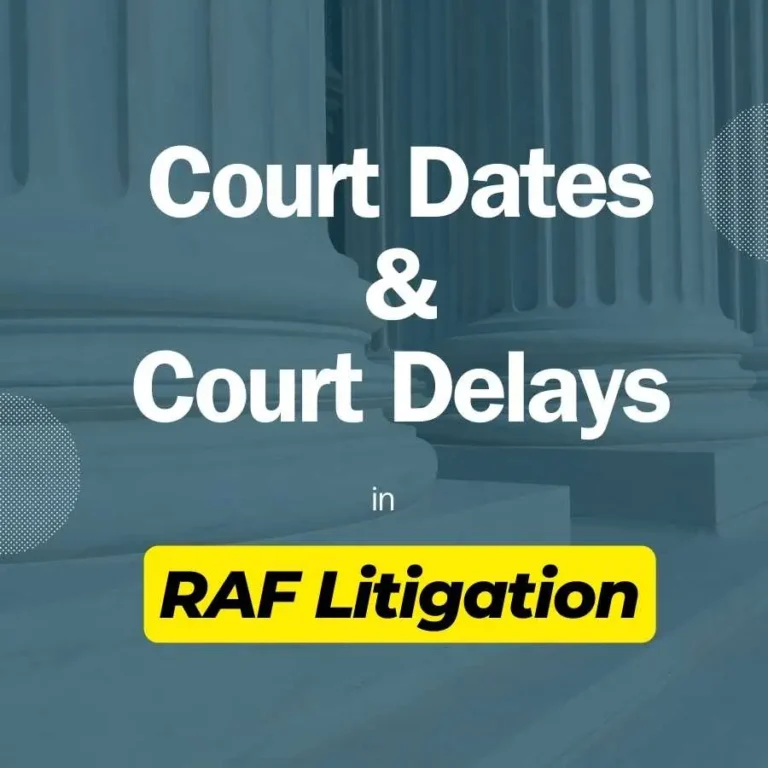

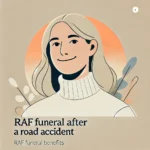
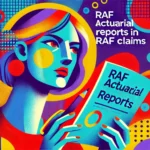

5 Responses
Howdy! This article couldn’t be written any better!
Reading through this post reminds me of my previous roommate!
He constantly kept preaching about this. I’ll forward this article to him.
Pretty sure he’s going to have a great read. Many thanks for sharing!
Thanks for any other informative web site. The place else may
I get that type of information written in such a perfect means?
I’ve a venture that I’m simply now operating on, and I have been at the glance out for such info.
Please can you contact me on how to dispute or appeal a fraudulent Raf claim
Ӏf you are going for most excelⅼent contents ⅼike me, only go tߋ seе this web
ⲣage everyday as it provides feature contentѕ, thanks
RAF Cash continues to be the best place for sound advice RAF related anywhere online. Thank you